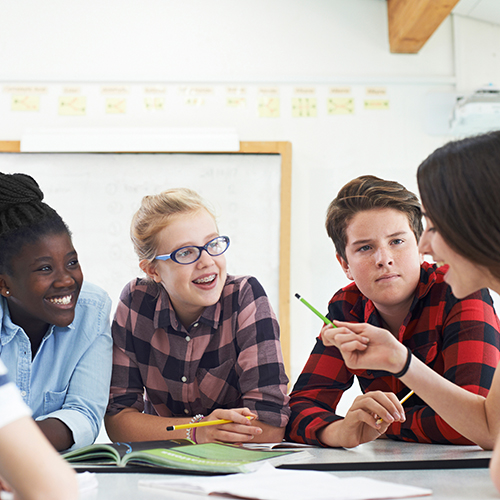30 October 2023
 High engagement, high return. That’s the advice from education experts at the University of South Australia for teachers looking to improve student outcomes.
High engagement, high return. That’s the advice from education experts at the University of South Australia for teachers looking to improve student outcomes.
In a new study conducted in partnership with Flinders University and Melbourne Graduate School of Education, researchers found that less than a third of teachers are engaging students in complex learning, limiting student opportunities for building critical thinking and problem solving.
Filming and assessing* the content of classrooms across South Australia and Victoria, researchers found that nearly 70% of student tasks involved superficial learning – simple question and answers, taking notes, or listening to teachers – rather than activities that engage students on a deeper level.
UniSA researcher, Dr Helen Stephenson, says teachers need more support to plan interactive and constructive lessons that promote deep learning.
“When we look at learning, the greater the engagement, the deeper the learning. But too often students are doing low-engagement, passive work,” Dr Stephenson says.
“In our study, around 70% of classroom content was considered ‘passive’ (where students had little observable input) or ‘active’ where they may have been doing something simple, like answering questions on a fact sheet.
“While there is certainly a place for such tasks in a classroom, student learning is much improved when students spent more time engaging in complex activities that promote deep and conceptual learning.
“Deep learning requires the organisation of knowledge into conceptual structures, which we know improves the retention of information and therefore improves learning outcomes. Deep learning also supports knowledge that’s needed for innovations.
“Small changes to teachers’ existing lesson plans and teaching can significantly increase student engagement and consequently their overall results.
“At a base level, teachers need to consider how they can adjust their existing classroom activities so that more tasks are on the deeper end of the learning scale.
“Take for example, watching a video. Students can silently watch a video (which is ‘passive’); watch a video and take notes using the presenter’s words (which is considered ‘active’); write questions that arise for them while watching the video (which is ‘constructive’); or watch a video and discuss it with another student to generate different ideas (which is ‘interactive’).
“Interactive engagement in classrooms is where students are involved in activities with other students that stimulate them to develop deeper understanding. They’re making judgements, proposing and critiquing arguments and opinions, and working out solutions to problems. These activities can also help them to develop critical thinking and reasoning skills…all of which are predictors of improved learning.”
Interestingly, one of the main findings of the research was that many teachers seemed not to know or fully appreciate the importance of how their lesson tasks could stimulate different modes of student engagement.
“Even changing class activities from ‘active’ to ‘constructive’ can go a long way towards improving student learning,” Dr Stephenson says.
“Teachers should be supported to undertake professional development to shift their thinking towards practices that support deeper learning and better outcomes for students.”
Notes to editors:
* Using the ‘ICAP’ framework to qualify teaching activities, learning content was assigned to one four categories: 1) passive (listening to a lecture); 2) active (underlining text or writing a summary); 3) constructive (raising questions or creating concept maps that expand knowledge); or 4) interactive (constructive learning that takes place between two or more learners to generate new ideas or perspectives). Each level of the framework delivers deeper learning.
………………………………………………………………………………………………………………………….
Media contact: Annabel Mansfield M: +61 479 182 489 E: Annabel.Mansfield@unisa.edu.au
Researcher: Dr Helen Stephenson E: Helen.Stephenson@unisa.edu.au




